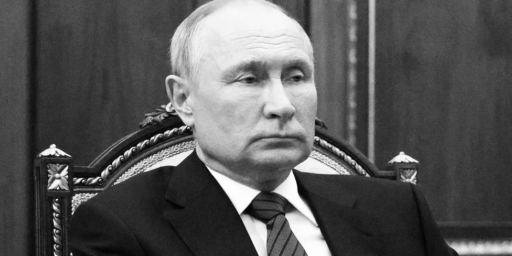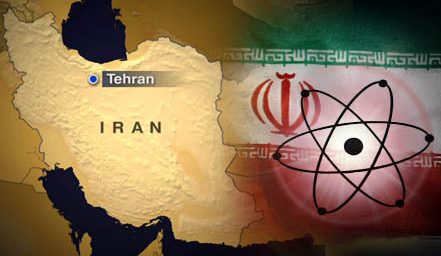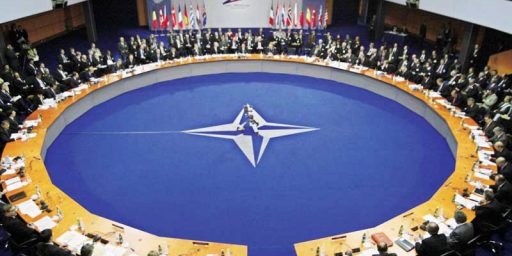Reforming NATO
A panel of top military figures from the United States, Britain, Germany, France, and the Netherlands have produced a report calling for sweeping reform of NATO:
Calling for root-and-branch reform of Nato and a new pact drawing the US, Nato and the European Union together in a “grand strategy” to tackle the challenges of an increasingly brutal world, the former armed forces chiefs from the US, Britain, Germany, France and the Netherlands insist that a “first strike” nuclear option remains an “indispensable instrument” since there is “simply no realistic prospect of a nuclear-free world”.
The group sees a number of major challenges facing the West:
- Political fanaticism and religious fundamentalism.
- The “dark side” of globalisation, meaning international terrorism, organised crime and the spread of weapons of mass destruction.
- Climate change and energy security, entailing a contest for resources and potential “environmental” migration on a mass scale.
- The weakening of the nation state as well as of organisations such as the UN, Nato and the EU.
They propose the following reforms:
To prevail, the generals call for an overhaul of Nato decision-taking methods, a new “directorate” of US, European and Nato leaders to respond rapidly to crises, and an end to EU “obstruction” of and rivalry with Nato. Among the most radical changes demanded are:
- A shift from consensus decision-taking in Nato bodies to majority voting, meaning faster action through an end to national vetoes.
- The abolition of national caveats in Nato operations of the kind that plague the Afghan campaign.
- No role in decision-taking on Nato operations for alliance members who are not taking part in the operations.
- The use of force without UN security council authorisation when “immediate action is needed to protect large numbers of human beings”.
Much of the attention in the Guardian news article cited and other news reports has been to the following:
The west must be ready to resort to a pre-emptive nuclear attack to try to halt the “imminent” spread of nuclear and other weapons of mass destruction, according to a radical manifesto for a new Nato by five of the west’s most senior military officers and strategists.
That’s nothing really new. The U. S. policy, at least unofficially, has been one of “strategic ambiguity” for some time.
Rick Moran, writing at PoliGazette, detects the influence of the Afghanistan experience on this report:
If NATO won’t fight in Afghanistan, where will they fight? As Russia grows in strength and confidence under Vladmir Putin, the former satellites of the old Soviet Union who are now NATO members may start to wonder if the countries of western Europe will confront that menace if a showdown were to come. With western interests and credibility at stake in Afghanistan and member states failing to answer the call, it is a legitimate question whether NATO would fight in the Baltic states or even in Poland, Slovakia, and the Czech Republic.
Although I agree with Rick that the experience in Afghanistan has motivated increased scrutiny on NATO, I remain skeptical about the mission there.
The report itself does not appear to be available publicly or, at least, I’ve been unable to find it. Perhaps James will have more success.
In the end I’m left with a number of questions. First, does strategic ambiguity enhance or diminish deterrence? Is it a political necessity that undermines the strength of deterrence? Second, does a supernational organization like NATO increase the strength of the nation state or reduce it? How does the majority rule provision of the report influence that? Finally, what is the role of NATO today? U. S. defense expenditures are around 4% of GDP, Britain’s around 2% and under substantial scrutiny at home, France’s somewhat lower, and Germany’s below 2% and falling. If NATO’s members, accustomed to the U. S. military aegis, elect to have armed forces incapable of projecting force beyond Europe, of what practical use is the old military alliance?
UPDATE (James Joyner): Ask and ye shall receive: World Security Network has the PDF of the report, “Towards a Grand Strategy for an Uncertain World Renewing Transatlantic Partnership.”
Via Nik Gvosdev, who has some excellent commentary on this report as well as Stanley Kober’s recent Cato report, “Cracks in the Foundation: NATO’s New Troubles [PDF].”






I worry about “majority rule”- no veto. Imagine the Islamic controlover the US in the UN if this were the mode of operation.
What if 51% voted to attack the US?
Pure majority rule without checks and balances is foolhardy.
I also wonder how a global superpower such as an enhanced NATO helps the nation state.
There are more reasons to worry.
Are we getting into a situation in which a majority can authorize an preemptive nuclear attack against the immanent spread (not use) of weapons of mass destruction? Are we more secure with this? How does this square with the Christian just war categories of legitimate authority and last resort? I can see how one might conclude that a preemptive attack against the immanent use of nuclear weapons could be a last resort – but the spread? Or is this just talking tough?
I don’t see this being anything more than fodder for the chattering class. Nothing will come of it.
Doesn’t seem to be much a point in NATO these days. The Warsaw pact is history.